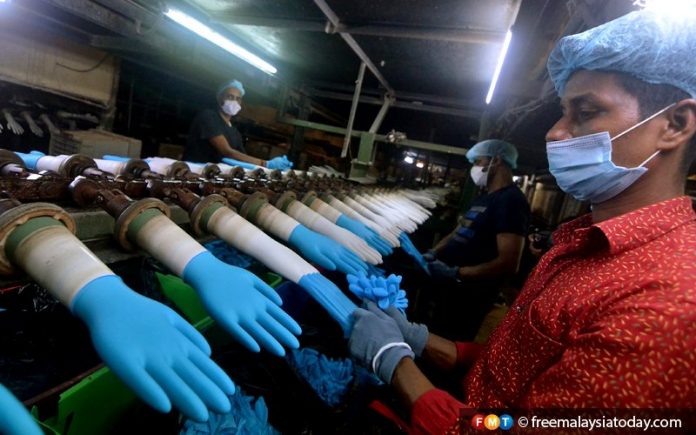
PETALING JAYA: Two key global glove importers are re-evaluating their relationship with a Malaysian glove manufacturer after government raids uncovered abysmal foreign worker accommodations at two of its subsidiaries.
Kimberly-Clark, the American personal care giant behind household brands such as Kleenex, Scott and Huggies, told FMT it was “evaluating the matter” when asked whether it would continue to source from the company.
Meanwhile, Ansell, an Australian safety and personal protection firm which supplies the UK’s National Health Service, said it was planning to meet the company’s managing director “as quickly as possible” to decide on the consequences of this “unacceptable situation”.
A multi-agency operation at one of the factories on Monday found 781 workers living behind the building in two blocks of shipping containers stacked three storeys high. A separate raid on its sister company on Thursday found workers crammed into two warehouses at either end of a pathway filled with mountains of garbage and factory waste.
“We were shocked to see such living conditions (in the first factory), which are absolutely unacceptable,” said an Ansell spokesperson.
“Based on the photos and video included in the media reports, it is evident that the living conditions provided for some workers at the site are unacceptable and are a violation of Ansell’s ethical labour standards, human rights statement and supplier code of conduct.”
The company also said it was in contact with other suppliers to determine alternatives and ensure it continued to meet the increased global demand for personal protective equipment during the Covid-19 pandemic.
Insisting it was “absolutely not” aware of the living conditions at the first factory, Ansell said a third party audit ordered by the company in May 2019 did not reveal the foreign workers’ dismal living conditions.
“We are investigating why,” it said.
Kimberly-Clark’s spokesperson, meanwhile, said it was concerned by the recent reports and was committed to ensuring that its employees around the world – including those of its suppliers – were treated with respect, with workplace and human rights standards met at all times.
“Through our processes to hold suppliers to high standards of safety, quality and compliance, we have identified some improvement opportunities and will continue to work with (the company) as we would with any supplier to enable meaningful improvements.
“Importantly, we also know that through continued engagement, there is a greater chance of affecting positive outcomes in this regard.”
This is not the first time either of the companies have had to take a closer look at the Malaysian glove manufacturers which they source from.
Ansell – which supplies to hospitals, care homes, local authorities and the private sector – also sources from Top Glove, the world’s largest glove manufacturer.
In 2018, Ansell was forced to investigate allegations that Top Glove was exploiting workers after an ABC News investigation revealed issues such as excessive overtime and costly recruitment fees among its foreign workers.
It is understood that Ansell still sources gloves from Top Glove.
US import ban
In July, two of Top Glove’s subsidiaries were placed on a list of restricted imports into the US by the US Customs and Border Protection (CBP) due to alleged forced labour issues.
This came after another Malaysian glove maker, WRP Asia Pacific, was slapped with the same withhold release order on its exports to the US in September 2019 after charges that its gloves were produced with forced labour.
The ban was lifted in March based on information obtained by the CBP showing that the company was no longer producing its rubber gloves under forced labour conditions.
For both Top Glove and WRP, the issue at hand was the exorbitant recruitment fees its foreign workers had to pay to secure jobs at the companies – pushing them into debt bondage, one of the 11 indicators of forced labour according to the International Labour Organization (ILO).
Among the other indicators were poor living conditions, placing the glove company supplying Kimberly-Clark and Ansell at risk of seeing their imports to several US companies being put on hold.
While a CBP representative was unable to disclose whether it was investigating specific entities, he told FMT that the CBP would continue to investigate credible allegations of forced labour in US supply chains and would prevent goods made by forced labour from entering US commerce.
“There are reputational, financial and legal risks associated with importing goods made by forced labour into the US,” said the CBP spokesperson.
“US importers have a responsibility to exercise reasonable care and to ensure that their supply chains are free of forced labour. CBP will not tolerate forced labour in US supply chains.”



